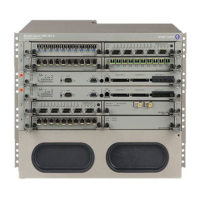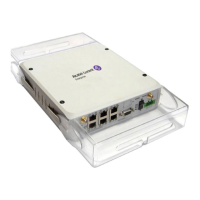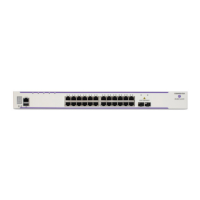Getting Started
Page 24 7705 SAR OS System Management Guide
Notes on 7705 SAR-8 and 7705 SAR-F
The 7705 SAR-8 and the 7705 SAR-F run the same operating system software. The main
difference between the products is their hardware configuration. The 7705 SAR-8 has an
8-slot chassis that supports two CSMs, six adapter cards, and a Fan module. The
7705 SAR-F chassis has a fixed hardware configuration, replacing the 7705 SAR-8 physical
components (the CSM, Fan module, and adapter cards) with an all-in-one unit that provides
comparable functional blocks, as detailed in Table 2.
The fixed configuration of the 7705 SAR-F means that provisioning the router at the “card
slot” and “type” levels is preset and is not user-configurable. Operators begin configurations
at the port level.
Note: Unless stated otherwise, references to the terms “Adapter card” and “CSM”
throughout the 7705 SAR OS documentation set include the equivalent functional blocks on
the 7705 SAR-F.
Table 2: 7705 SAR-8 and 7705 SAR-F Comparison
7705 SAR-8 7705 SAR-F Notes
CSM Control and switching
functions
The control and switching functions include the console and
management interfaces, the alarm and fan functions, the
synchronization interfaces, system LEDs, and so on.
Fan module Integrated with the
control and switching
functions
16-port T1/E1 ASAP
Adapter card
16 individual T1/E1
ports on the faceplate
The T1/E1 ports on the 7705 SAR-F are equivalent to the
T1/E1 ports on the 16-port T1/E1 ASAP Adapter card, except
that the 16 T1/E1 ports on the 7705 SAR-F support multiple
synchronization sources to support two timing references.
On the 7705 SAR-8, the CLI indicates the MDA type for the
16-port T1/E1 ASAP Adapter card as a16-chds1. On the
7705 SAR-F, the CLI indicates the MDA type for the
7705 SAR-F ports as a16-chds1v2.
